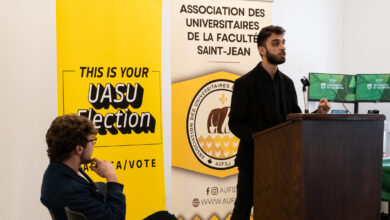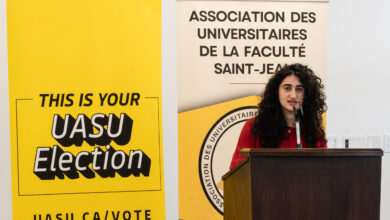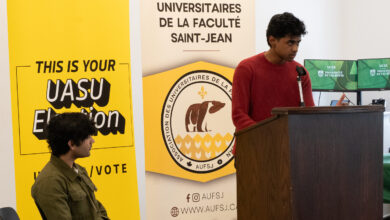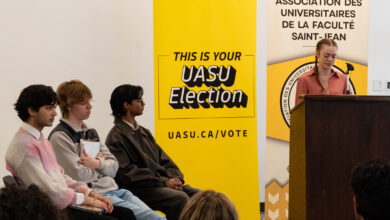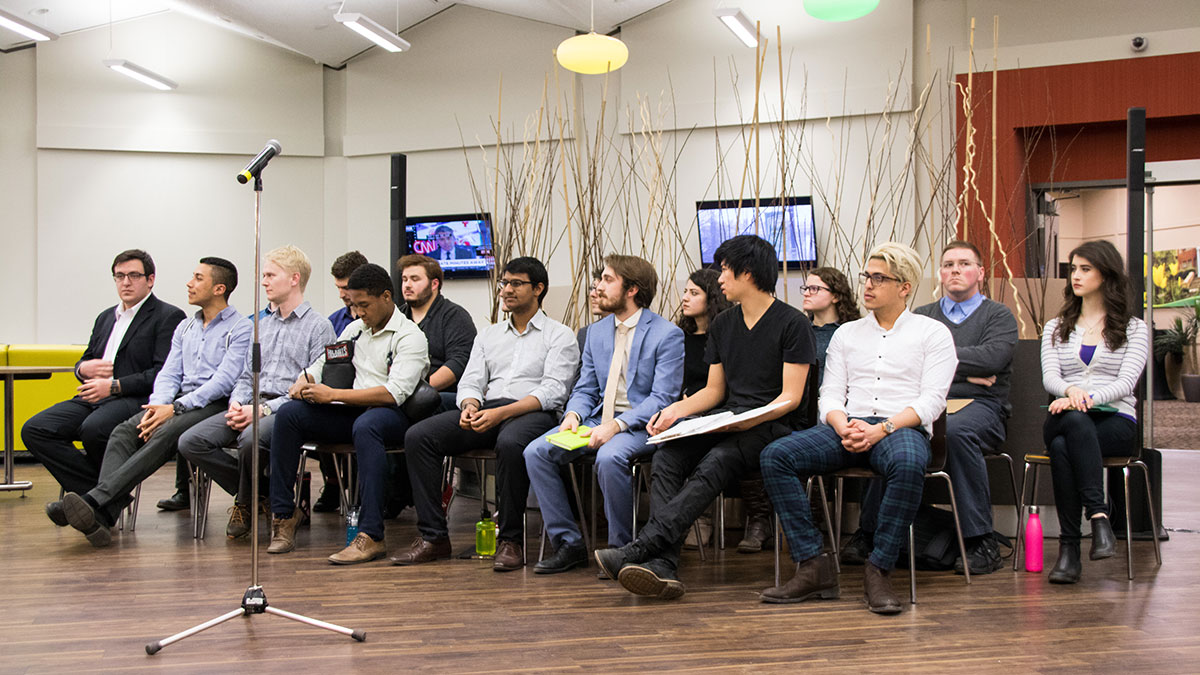 Christina Varvis
Christina VarvisThe three candidates have proven themselves in their respective Vice-President positions this past year, making this race one of the most intriguing.
Cody Bondarchuk is continuing his pursuit of campus equity. He pledges ongoing support of the student-run Landing, which with the proper funding has the potential to be one of campus’ most influential student LGBTQ+ voices, especially if they continue to host interesting speakers. Another of Bondarchuk’s good ideas is regular town halls between Students’ Council and faculty associations. It’s a concerted effort to communicate as regularly and directly with students as possible. The comparatively informal format of town halls and its wide inclusion of voices might reveal what the rigidly structured Students’ Council might not.
I’m ambivalent about Bondarchuk’s proposition to assess tuition based on classes rather than credits, which is a rather interesting idea. It would be beneficial for students as they would likely pay less for certain classes and it’s useful for knowledge collection, but money would need to come from somewhere. Student tuition currently consists of 18 per cent of the university’s overall revenue, and what would be eliminated in tuition costs would need to be supplemented by higher prices elsewhere for students or by the government.
Bondarchuk seems to fall into the trap of demanding too much from the government and asking that students pay little. He and Dylan Hanwell are right to say that now is a better opportunity than most in recent memory to ask the government for money, but it’s difficult to see the government giving away much more money anytime soon than it already does, especially now that the price of oil is so low. It might just be a bad year to lobby for lower tuition.
Fahim Rahman seems to be taking an appropriately conservative stance on tuition. Increased funding for grants and bursaries would keep administration content because tuition isn’t being cut and Rahman is right to allow faculties other than the SU distribute certain bursaries that often go unclaimed. He’s also done his time in student governance and his public speaking has improved substantially — although he might be better off without certain videos.
Rahman’s mental health platform features one of the most concrete and one of the least concrete proposals seen thus far. He plans on implementing the same popular programs that students saw during Reading Week throughout the whole year. The rest of his mental health platform is standard: he describes the problems in detail and what must be done (being “proactive”) but the rest is loaded with buzzwords and his main point seems to be to lobby the government, a different approach he takes to tuition. When mental health is argued without a detailed plan apart from lobbying the government, the very phrase “mental health” becomes annoying. Bondarchuk is smart to deemphasize mental health in his platform because it’s taken for granted that he’ll advocate for it. Since Rahman brings up mental health, he should be specific on, for example, if the SU should hire more psychologists and counsellors, what disorders should treatment be focused on, if the SU should collect money to hire its own professionals, etc.
Rahman’s academic leanings seem to resemble too closely those of a technical college and his biggest concern seems to be that education is used to get jobs. I wouldn’t really care if his plan was to simply advocate administration, but he wants to create a centralized office for internships, practicums and community service learning. It would probably be useful for many, but it’s unclear how this would be different from what the university already offers. There’s also a certain level of defeat that students must accept regarding job prospects: jobs aren’t always there. It’s funny how an engineering student who asked a question at the Myer Horowitz forum would think that somehow the SU could find engineering jobs in our current economic situation. Meanwhile, Arts students laugh themselves to tears.
Dylan Hanwell’s campaign initially seemed somewhat disorganized: his points were very similar to Bondarchuk’s and his full platform wasn’t online until relatively late in the campaign. It’s smart self-fashioning as the U-Pass guy, and while most candidates would presumably do what he proposes to do anyway, Hanwell might be most suited to get students a bargain because of his VP External experience. Also, his efforts to offer grants in order to attract Aboriginal, rural and low-income students are admirable.
But Bondarchuk and Rahman seemed to have built their tuition arguments in opposition to Hanwell’s. Hanwell seeks to lower tuition by seeking “a large reduction in tuition” while “the ultimate compromise will end up being much better for students.” Hanwell has even said to begin bargaining from half of what tuition costs now. He acknowledges how some might find this difficult to accomplish. I find it difficult that the government would take it seriously. His ambition is understandable since working with the NDP is exciting, but again, it might not be the year to ask no matter how charming Hanwell is. I can’t help but feel he’s being somewhat disingenuous by not fully recognizing students’ place in university’s economic exchange and by playing up that “students deserve more.”
All three candidates advocate that the SU should assert more control over student groups than the Dean of Students. Hanwell is right to point out that the Dean of Students needlessly denied club status to a brewing club and that administrative control disbanded the LHSA. Yet it’s difficult to trust the SU to protect the rights of dissenting student groups. The Dean of Students’ office has hindsight and a thorough understanding of the law; the SU has political motivations and is accountable to students who think that, for example, abortion images violate the student code and constitute hate speech. At best, student groups could hope for a double standard in which some groups are punished more severely than others (in the name of restorative justice). Also, it would be better if student groups sued the university rather than the SU.
Of course, platforms change throughout the year and much of the President’s job involves management and leadership independent of campaign promises. I’m leaning toward voting for that socialist Bondarchuk, but the SU wouldn’t be in a bad place no matter what happens.

